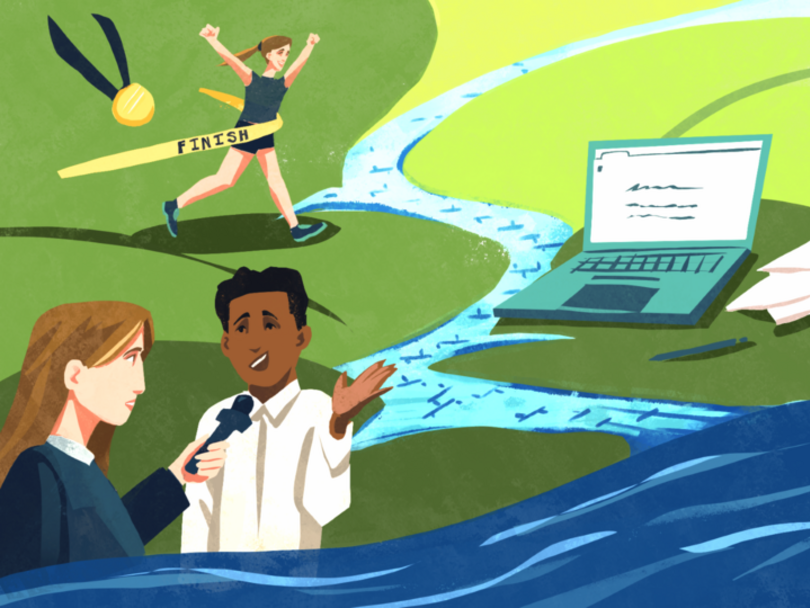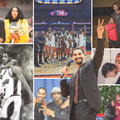Personal Essay: College provides a chance to lose your identity, find it again

Measuring life by achievements stunts security of self identity. Our writer reflects on their college experience to emphasize the importance of patience in discovering one’s true self. Flynn Ledoux | Illustration Editor
Get the latest Syracuse news delivered right to your inbox.
Subscribe to our newsletter here.
Permission to grow and change without being taken seriously is both the blessing and curse of youth. I felt grateful that I could reinvent myself as a high schooler by dyeing my hair purple for fun, knowing the dye would fade and my relatives and friends would forget about it in weeks.
But when you’re finding yourself, it’s also frustrating and invalidating to feel like the new versions of you are only mere “phases.” It’s easier to think you know who you are than accept that we’re all subject to change.
I entered college at 18 years old thinking I had a crystal-clear view of myself and what I stood for. I operated like I’d already reached my final form. In meeting long-standing goals I’d set for myself in high school, I felt sure I’d reached my highest potential.
After getting to college, though, it was exhausting to realize how much more work laid ahead of me in the process of maturation.
Changing is guaranteed and painful during our college years. As much as we don’t understand ourselves during adolescence, many of our traits and features last a lifetime — whether we want them to or not.
As a recruited coxswain for Syracuse University’s women’s rowing team, I was expected to be humble, self-assured and able to make decisions for my crew with confidence. No air of doubt should slip through a coxswain’s language or tone, even if the coxswain themself is invisibly riddled with doubt and uncertainty.
I quickly realized I knew significantly less than I thought I did about the sport of rowing. The world expanded the moment I sat in one of the beautiful SU racing shells for the first time, mic’d up, instructing a group of older, more seasoned athletes how to improve their form.
When I was confronted with the need to improve, it rattled the very ground I’d built my self-perception upon up to that point.
This realization triggered feelings of existentialism I’d never encountered before. Instead of feeling inspired by the necessary growth I was facing, I was overwhelmed. The preferred version of myself, who I believed was a talented athlete, crumbled under the realization that being recruited didn’t end my effort toward progression in the sport.
As I could no longer self-identify as a “completed version” of myself in my rowing career, I fell victim to an anxious series of developments.
In this whirling state of mind, I began losing confidence in the idea that I knew myself or the world around me at all. I was certain my formerly unshakeable self-image was rooted in youthful naivete.
I became fixated with expediting the process to the next edition of myself, looking for solace in this uncomfortable self-reckoning journey. But unlike my adolescent view of self-reinvention, my process of growth was built on the desire to quickly find my fully-grown identity and cling onto it as tightly as I could.
As we mature, it can be overwhelming to realize our current forms aren’t our final ones.Maya Aguirre, Columnist
I was set on finishing the painful process of growing up as quickly as possible by manufacturing my final form — even though it was inauthentic.
By the spring, nothing in my life was the same. I stopped rowing. I left SU for the semester. I decided to apply to nursing school, leaving my dream to be a journalist behind.
I dyed my hair from light brown to dark red. I changed my music taste and the way I dressed. I determined I was actually an introvert, and that my lifelong pursuit of athletics was driven by pressure from others, not by my own passion.
I found empowerment in rejecting all of my superficial qualities and even core principles, as I figured taking extreme measures of reinvention meant the gradual process of growing up could never take me by surprise again.
With time, it was obvious that erasing myself as I had been was ineffective. The dark red hair dye inevitably faded back to brown. By the fall, I was back at SU studying journalism. I sheepishly reinstated my qualities and values I had deemed as disposable.
But while I returned to many of the values I had briefly rejected, I embraced change — I didn’t return to the rowing team, and I expanded my academic interests by taking science and history courses alongside journalism courses.
Socrates theorized, “All I know is that I know nothing,” which, to me, feels like the most accurate depiction of the human experience. While the phrase is often attributed to a person’s constantly evolving view of the outside world, it applies to our internal worlds, too. As we mature, it can be overwhelming to realize our current forms aren’t our final ones.
I determined the values that had guided my goal-setting in my earlier years didn’t have to go away, they just began manifesting themselves differently.
Being an athlete was important to me, so I maintain that value now by running. By writing opinions for The Daily Orange, I found writing was a genuine passion of mine, and rejecting it had been an unnecessary exercise of agency.
In all of these attempts at better understanding myself, I neglected to recognize that I wasn’t meant to solidify my personality at the age of 18. But by accepting change rather than forcing and expediting it, we take ownership of our growth. Allowing room for this grace leads us down previously unfeasible paths that align with our moral and personal guidelines.
Nearly through my third year of college, I now consider the uncomfortable slow burn of self actualization a privilege and something to be celebrated, not deterred by.
Maya Aguirre is a junior magazine news digital major. Her column appears bi-weekly. She can be reached at msaguirr@syr.edu.






